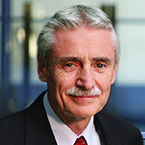
Awarded the 2001 Nobel Prize in Physiology or Medicine, Dr. Hartwell was honored for the discovery of the key regulators of the cell cycle and the fundamental role of checkpoints in cell cycle control. By identifying “checkpoint” genes that determine whether a cell is dividing normally, he provided the foundation upon which today’s detailed knowledge of the molecular mechanisms controlling the cell division cycle in nucleated cells rests. His research also showed that gaps in a cell cycle allow for the repair of damaged DNA.
Dr. Hartwell’s pioneering work has had a major influence on our understanding of cancer and the therapeutic strategies used to treat diseases caused by uncontrolled cell growth. In addition to his Nobel Prize, he has been the recipient of most of the major awards that the cancer research community can bestow, as well as the Medal of Merit, the State of Washington ‘s highest honor.
Career Highlights
2017 Builders of Science Award, Geoffrey Beene Foundation
2009-Present Virginia G. Piper Chair of Personalized Medicine; Chief Scientist, Center for Sustainable Health, Biodesign Institute, Arizona State University
2005 Distinguished Scientist Award, Association of American Cancer Institutes
2004 Alfred G. Knudson Award in Cancer Genetics, National Cancer Institute
2001 Nobel Prize in Physiology or Medicine
1999 American Cancer Society Medal of Honor
1999 Distinguished Alumni Award, California Institute of Technology
1998 Albert Lasker Basic Medical Research Award
1998 Brinker International Award for Basic Science, Susan G. Komen Breast Cancer Foundation
1997-2009 President and Director, Fred Hutchinson Cancer Research Center
1994 Genetics Society of America Medal
1992 Gairdner Foundation International Award
1991 Alfred P. Sloan Award, General Motors Cancer Research Foundation
1987 Elected Member, National Academy of Sciences, Washington, DC
1973 Eli Lilly Award in Microbiology and Immunology
1964 PhD, Massachusetts Institute of Technology